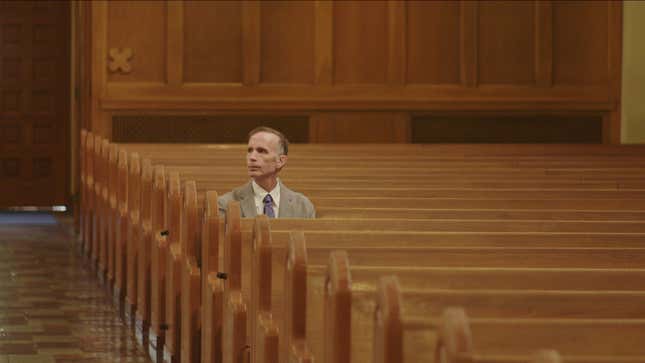In Procession, Survivors of Catholic Priest Abuse Confront Their Experiences
In an interview with Jezebel, director Robert Greene discusses his experimental approach to filmmaking and therapy
EntertainmentMovies
Image: Netflix
The film Procession, which debuts on Netflix today, confronts and thereby attempts to mitigate the memories that haunt its participants most. The project gathers six survivors of sexual abuse by priests in the Catholic church—Joe Eldred, Mike Foreman, Ed Gavagan, Dan Laurine, Michael Sandridge, and Tom Viviano—and has them revisit and recreate scenes from their past adjacent to the abuse they experienced. Director Robert Greene blended drama therapy techniques and filmmaking elements like location-scouting and set-building; the result is devastating and bleak and, apparently for them, cathartic. As viewers, we see the nightmares start to recede as the participants, an effective support group, hold each other up while exorcising the demons that came directly from the Catholic church.
Greene (Kate Plays Christine, Bisbee ‘17) was inspired to explore this subject matter after watching a press conference held in Kansas City, Missouri, in August 2018. It featured several of the men who would go on to become Procession’s subjects, as well as attorney Rebecca Randles, who represented them, as well as many sexual abuse survivors in the area. During it, she announced that over 230 priests in the Kansas City area “that we know of” that had been accused of abuse. Their crimes were obfuscated for years, sometimes with the assistance of higher-ups, who shuffled accused abusers to other dioceses with few apparent consequences. The now middle-aged subjects of Procession detail their frustrations with attempting to achieve justice via church processes in the legal system. The despair is palpable.
“I was like, you know, maybe we can help,” Greene recalled after seeing the press conference. “This is my seventh film now, and I looked at the techniques that we had learned and the things that we had done [in previous films] with staging scenes and how that had been helpful and how I know making a movie is helpful. I was just like, why not? Why not try?”
And try he did, in a process that was three years in the making (the covid-19 pandemic delayed things considerably). Greene talked to Jezebel about his filmmaking philosophy, borrowing from drama therapy, and the safeguards he had in place for his subjects. An edited and condensed transcript of our conversation is below.
JEZEBEL: While there is growing evidence of its effectiveness, drama therapy is still considered experimental. Did that concern you at all?
ROBERT GREENE: Very importantly, we weren’t doing drama therapy. That was my original idea. I went to a group of drama therapists and I said, “I want to do drama therapy on film,” and they’re like, “You can’t do that.” It’s too experimental, basically. Drama therapy does not include a camera and editing. But I have faith in filmmaking. I knew how confronting in this really subversive way, like transforming the spaces into what we wanted them to be… I just believed that that was correct and drama therapy backed that up. That’s how I looked at it: I believe this is correct, and there’s a discipline up there that is backing this up, and we have a drama therapist [Monica Phinney] here. A lot of my confidence came from editing. I am an editor. I know how to make Dan be able to watch this film back and feel proud of himself. I know how to make Mike watch the film and say, “Look how I changed over the course of the film. My anger is justified and I’m being heard.” I knew that I could edit the scenes to give that back to the guys. And then an audience watching it is so important. It’s maybe the most important part of the whole process because the finished thing matters even more than the experiences of making the thing.
What made you want to go there with this difficult subject matter in the first place?
Making it visible takes powers away from those nightmares, literally and figuratively. Those are nightmarish scenarios. Those are nightmarish images. It’s a nightmarish situation and it becomes actual nightmares unless you can do something to diminish it. So weirdly, to make the film feel so dark and appropriately horrible, that helps diminish the power of the images. A movie can be contained. Monica Phinney, the drama therapist, she talks a lot about distancing. Making it a movie allows you to distance it from the daily trauma that you’re replaying again and again and again and again. Projecting that out allows you to see it. I think these guys knew that and they certainly know it now. They were a big part of the editing process. They’ve been a big part of the rollout process. I think watching it back for them is the proof that these things should not be hidden. The shame comes from: “I have to hide this because it’s a mark on me.” But when you suddenly don’t have to hide it anymore, that pressure gets alleviated.
-

-

-

-

-

-

-

-

-

-

-

-

-

-

-

-

-

-

-

-

-

-

-

-

-

-

-

-

-

-

-

-

-

-

-

-

-

-

-

-








































